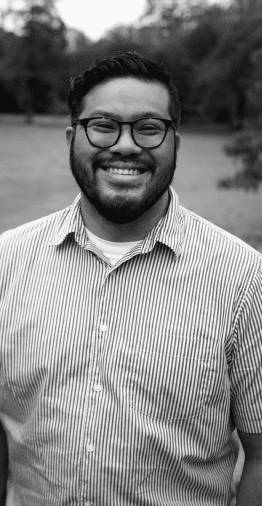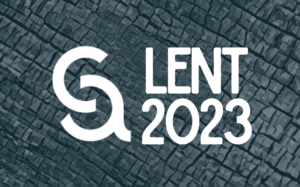You can listen to an audio version of this piece here.
 I did not grow up in a church that observed Lent, but I did grow up around altar calls. For me and my community, these deeply emotional and cathartic encounters at church were often the catalysts for the spiritual transformations I longed for in my youth. And while I’m not entirely against altar calls at this point in my life, I have grown an appreciation for the longer, slower journeys of transformation that are often tied to spiritual rhythms like fasting and prayer. I still long for God to meet me in my desire to be changed.
I did not grow up in a church that observed Lent, but I did grow up around altar calls. For me and my community, these deeply emotional and cathartic encounters at church were often the catalysts for the spiritual transformations I longed for in my youth. And while I’m not entirely against altar calls at this point in my life, I have grown an appreciation for the longer, slower journeys of transformation that are often tied to spiritual rhythms like fasting and prayer. I still long for God to meet me in my desire to be changed.
Lent disrupts the status quo of my life by removing certain creature comforts and attachments that orbit my attention daily. In the past, I’ve given up all the usual suspects: meat, alcohol, snacks, and sweets. Each time I reluctantly opted into Lent, I did so with the hope that I might actually be met by God through relinquishing good things for the possibility of receiving something ultimately satisfying. What I want is transformation: not for the sake of vanity, or for fear of judgment, but because I know that life can taste better when I confront my own patterns of self-destruction. My family has to deal with who I am. I have to deal with who I am. Though in theory, Lent checks all the boxes for seeing transformation take place in my own life, my fear is that transformation might not actually come.
I am no stranger to transformation. And yet, it remains an utter mystery to me. How do people actually change? I often wonder if transformation is easier to spot when it goes opposite the direction you want. For instance, last September, I noticed I had increasingly grown impatient and grumpy with my two elementary school-aged sons. Their needs, desires, and temperaments are constantly changing. They have a lot of feelings. I don’t always know what to do with those feelings. This often happens at the most inconvenient of times, like when we’re running late to get them to school (oftentimes, my fault), and the smallest slight from either of them turns into a shoving and whining match. In my half-caffeinated, tired, and anxious state, my pattern has been to try to end the whole affair with empty threats of consequences in progressively louder statements that ultimately end in yelling. When these episodes occur, I ask myself in frustration: How did I get to be so impatient? When did this happen? Who have I become? Who am I becoming?
Transformation is both obvious and hidden, and the transformations I long for, especially when I think about Lent and the Divine, are even more mysterious. Lent is often thought of as patterned after the multiple accounts of 40-day periods of preparation throughout Scripture. From Moses’ experience on Mount Sinai receiving the Ten Commandments as his people wandered throughout the desert, to Jesus’ 40 days in the wilderness, fasting amidst constant temptation from Satan, preparation and transformation foreground our Scriptural understandings of Lent. During this season, I am reminded of the holy fleshiness of my existence, along with the imperfections that are entailed in my glorious finitude. Reflecting on my bodily and even emotional limitations reminds me that I don’t often show up in the world the way that I want to. I am not always the most gracious partner, the most patient dad, the most dependable friend, or the wisest mentor. But I desire to grow in those directions. Lest I be misunderstood, perfection is not what I seek in Lent; what I am after is the holy transformation that takes place when we lay down what we are able, out of expectation and hope, and not compulsion, in order to see how God meets us in that.
I have the joy of knowing several colleagues who belong to the Orthodox Church. In getting to study Orthodox theology alongside them, I have come to learn about the Orthodox concept of theosis. Theosis is the way that Orthodox Christians understand salvation—it is the process of becoming like God. Theosis for the Christian, then, is the journey toward participating in the very life of God. This participation is initiated by Jesus’ work of reconciling creation to God’s very self and is an ongoing process in which humans participate through the power and presence of the Holy Spirit. Key to this notion of theosis is the participation of human creatures. Orthodox theology understands that theosis is inseparable from kenosis—self-emptying—and is embodied in Scripture most clearly in the Christ hymn of Philippians 2 which describes Jesus’ incarnation, life, death, and resurrection. Kenosis looks different for everyone and is a theological concept that has rightfully been critiqued by feminist and womanist theologians for the way that self-sacrifice has historically been weaponized against women in particular. At its heart though, kenosis might be best understood as entrusting oneself to another. It is an act of vulnerability that longs for reciprocity and cannot be demanded or coerced. To journey toward theosis—union with the Divine—is to entrust ourselves to God: our faults, shortcomings, longings, hopes, and dreams.
This Lent, I am reminded that I am swept up in the winds of theosis, and God’s invitation for me is to participate both in God’s very own life and in my own journey of transformation. My finitude and imperfections don’t make me bad; they make me human. And in light of my humanity, and for the sake of those with whom I share humanity most closely, I long for transformation. I long for transformation that draws me to entrust myself to God and those I love, more deeply. Lent challenges my faith to believe that transformation, even in the most stubborn of people like me, is indeed possible and that I am graciously invited by the Triune God to be a part of my own transformation. My prayer is that God would surprise us all with seeds or fruits of transformation in our own lives this Lenten season.
 David de Leon is a doctoral student studying systematic theology at Fordham University in New York City. A child of Pilipino immigrants, David grew up in Vallejo, CA. For 12 years, he worked in university campus ministry, pastoring students and mentoring other campus ministers. He has extensive experience in directing global justice immersion programs. In 2021, he received his Master of Divinity degree from Yale Divinity School. He writes, teaches, and reflects on Pilipino/Pilipino American/Asian/Asian American identity, faith, and colonial histories. He is currently Social Media Manager and Content Specialist for Christians for Social Action.
David de Leon is a doctoral student studying systematic theology at Fordham University in New York City. A child of Pilipino immigrants, David grew up in Vallejo, CA. For 12 years, he worked in university campus ministry, pastoring students and mentoring other campus ministers. He has extensive experience in directing global justice immersion programs. In 2021, he received his Master of Divinity degree from Yale Divinity School. He writes, teaches, and reflects on Pilipino/Pilipino American/Asian/Asian American identity, faith, and colonial histories. He is currently Social Media Manager and Content Specialist for Christians for Social Action.


